Big enough to challenge Small enough to care.
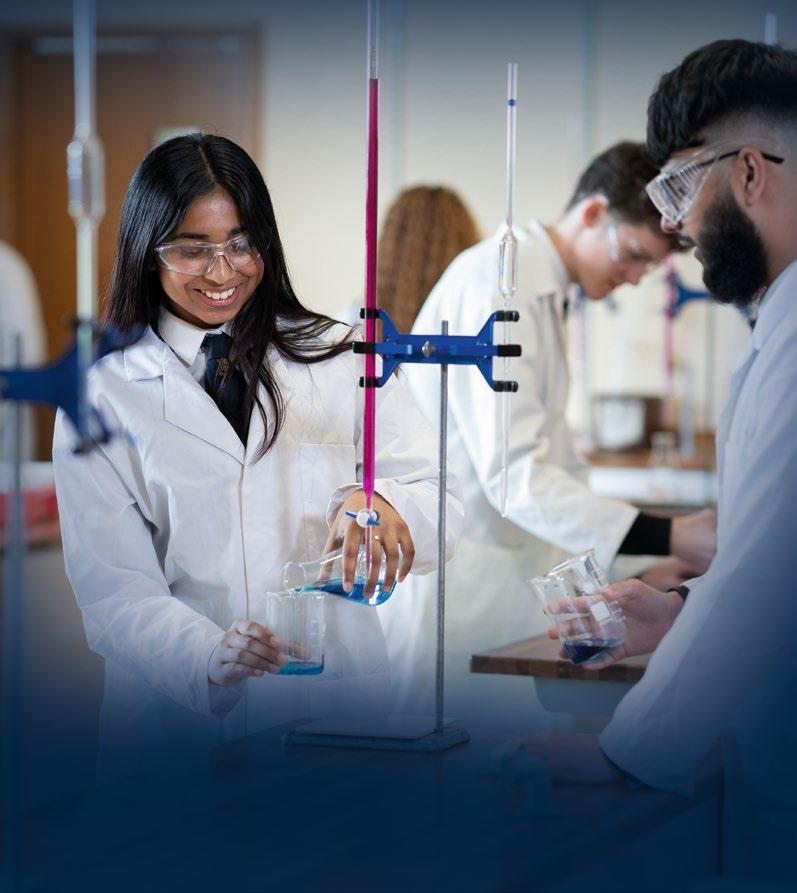
Lord direct us to LIVE life to the full


Big enough to challenge Small enough to care.

Lord direct us to LIVE life to the full

Choosing where to study post-16 is one of the most important decisions you will make about your future.
By choosing our Sixth Form, you are prioritising academic excellence in a warm, hard working community. If you know you want to achieve the highest grades possible at A level, whilst developing further as an individual, then this is the right place for you.
We will invest in you as an individual and challenge you to “Live life to the full” (John 10:10), becoming the best version of yourself in a supportive environment.
Mrs
Michael, Principal
Big enough to challenge Small enough to care.

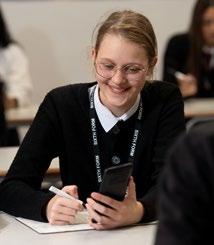
At St Wilfrid’s, we are a faith-based sixth form inspired by the words of John 10:10: “I have come that they may have life, and have it to the full.” This verse is at the heart of all we do. We believe that education is not simply about grades – it is about nurturing the whole person so that every student can flourish academically, personally, and spiritually.
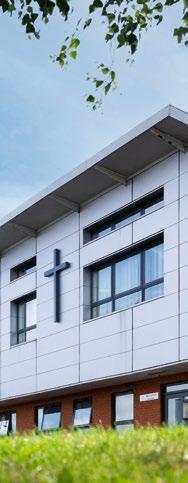
Our staff have high expectations of all students and encourage them to embrace challenge and aspire beyond the limits of the curriculum. We expect students to be organised, punctual and enthusiastic about learning. With access to a wide range of academic resources, our learners are equipped to chase their aspirations and achieve success.
We believe that strong relationships between teachers and students are key to unlocking potential. With smaller class sizes, each learner receives the individual attention and encouragement they need. Our teachers provide high-quality support both inside and outside the classroom, ensuring that every student has the opportunity to grow in confidence, develop independence, and take ownership of their learning journey.
We are committed to removing barriers to education. Through the 16–19 Bursary Fund, students who need extra financial support can access help with travel costs, textbooks, stationery, and other resources essential for learning. Further details, including eligibility, can be found on our college website.
Participating in the core RE programme opened our eyes to real world dilemmas and deepened our understanding of society. It allows us to develop our critical thinking and oral skills in thoughtful debate in a comfortable and open setting.
Parsha, Dentistry at Manchester
The Sixth Form is a fantastic environment for students to develop core educational skills as well as soft skills such as organisation and communication. These are vital for helping students transition into university or the world of work.
Nick, Assistant Investment Consultant at KPMG
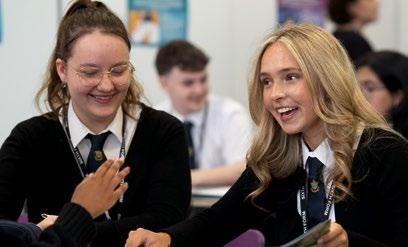
My experience at Sixth Form was incredible! The staff pushed me to try new things and encouraged me every step of the way. Being cast in the production really boosted my confidence and has helped launch my career in acting.
Elliot, Actor in Musical Theatre
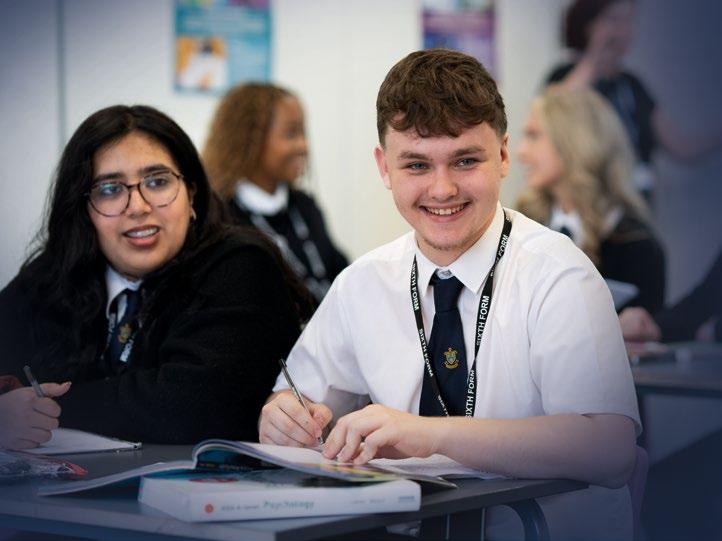
I appreciated the supportive and caring atmosphere at St Wilfrid’s – the teachers strive to push their students to their maximum potential, going above and beyond and working tirelessly to make sure students are looked after.
Shamima, Higher Apprenticeship with PWC
The staff at St Wilfrid’s were always happy to help me with career exploration, subject support and the process of applying to university. Their support continued after my studies, showing that staff are just as committed to me achieving my goals as I am myself!
Farhaan, applying to study medicine
St Wilfrid’s is such a supportive family in a community setting. I am now pursuing my dream career and would not be where I am today without the hard work and constant support of the teachers there.
Zoe, workin g as a Learning Support Assistant
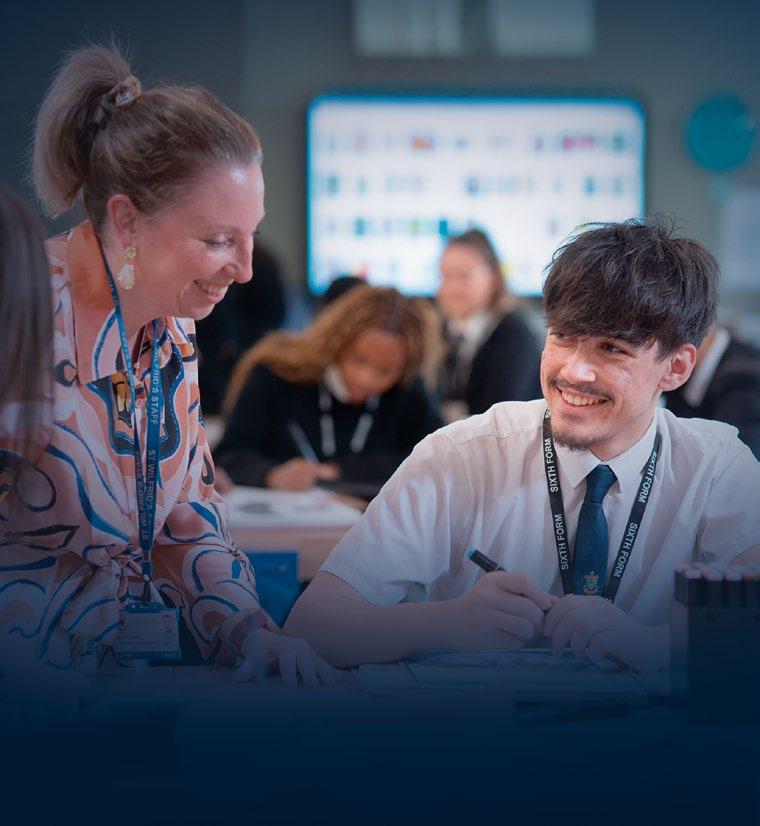

A levels are traditional, academic qualifications which are highly valued by both universities and employers. At St Wilfrid’s, we offer nearly 30 A levels in a range of subjects –from Biology to Criminology.
Typically, A levels are assessed by examinations at the end of two years of study, although some will also require coursework. A levels will suit you if you perform well in exams and want to study a range of subjects in more depth.
A levels are nationally recognised qualifications which gain valuable UCAS points when applying for degree level study. Each A level completed will be graded from A* to U and is worth up to 56 UCAS points, which can be used towards university entry requirements.
It is important that you do your research before choosing your A level subjects. Some university degrees will only accept A level qualifications and some degree courses require a particular A level subject, e.g. you need A level Chemistry to study Medicine. So if you have a particular course in mind, you should check the entry requirements carefully.
You may instead want to keep your future options open when choosing your A levels and select a smart mix of the most commonly asked for subjects in university entry requirements.
These are known as ‘facilitating’ subjects and include: Mathematics; Sciences; English; History; Geography and Modern Languages. These aren’t essential but come highly recommended. A good website for you to research is www.informedchoices.ac.uk.
The majority of students choose three A level courses to study full time over two years. However, you may request to study four subjects if you have done really well at GCSE. You will also have the chance to complete extra-curricular opportunities which will develop your transferable skills, extend your subject knowledge and add that X-factor to your CV or university application.
St Wilfrid’s has a dedicated Sixth Form Centre with a spacious common room and Study Zone.
Our Sixth Form Learning Resource Centre (LRC) offers a great space for you to extend your subject knowledge through independent study, with access to thousands of resources online and through the library catalogue. Across the Academy we have well-equipped classrooms and laboratories with interactive whiteboards, as well as specialist ICT and Mac suites with industry standard software to enhance your studies.
At St Wilfrid’s Sixth Form, we also offer Level 3 qualifications such as Criminology and Human Biology as alternatives to A levels. These courses provide a different style of academic learning, blending theory with applied elements to suit varied learning preferences, while still keeping progression to university open. They are designed to be more practical and career-focused, combining coursework with applied learning to develop the skills needed for both employment and further study. Our team will support you in choosing the pathway that best matches your strengths and ambitions.
An Extended Project Qualification (EPQ) is an additional qualification which you can choose to take alongside your A levels. It is most suitable for those who would like their application to stand out, but it does not need to be related to a subject you are studying.
As part of an EPQ, you choose a topic or question that you research in great depth. This assessment can either be via written report (of no more than 5,000 words) or by creating a ‘product’ – this could be hosting an event or making a physical item such as a piece of art or a video game.
The EPQ is also a fantastic opportunity to experience university-style study and expand your knowledge in an area of interest. It also teaches you some valuable skills that will be applicable at university and beyond, such as self-discipline and independent research on a topic you really love.
Your chosen topic can be on any subject (as long as it is not included in the specification of your subjects). Recent examples of EPQ titles include:
‘The impact on Human Rights of the US and UK legal response to terrorism’ and ‘To what extent is rehabilitation effective in UK prisons?’.
Participating in the core RE programme opened our eyes to real world dilemmas and deepened our understanding of society. It allows us to develop our critical thinking and oral skills in thoughtful debate in a comfortable and open setting.
Freya and Aliza, Year 12
Our Core RE programme is something available to all Year 12 students at St. Wilfrid’s, exploring morality, theological, philosophical, and sociological themes through a dynamic lecture and skills format, equipping students with essential tools for life beyond the classroom.
Each week, students attend a lecture followed the next week by an active skills session, allowing them to grapple with contemporary issues such as medical ethics, war and peace, or AI in society, while also engaging with classic ethical theories from thinkers like Kant and Aristotle. Through this model, students sharpen their ability to think critically, speak persuasively, and consider diverse viewpoints with empathy and intellectual rigour.
Skill development is a key focus, and across the year students enhance their reasoning, debate, and communication abilities through case studies, dilemma discussions, presentations, and mock trials. Guest speakers and interfaith encounters add depth and authenticity to the experience. Exposure to sessions such as this only expand the horizons of our students, and increase their understanding of the world they’re entering into post-18.
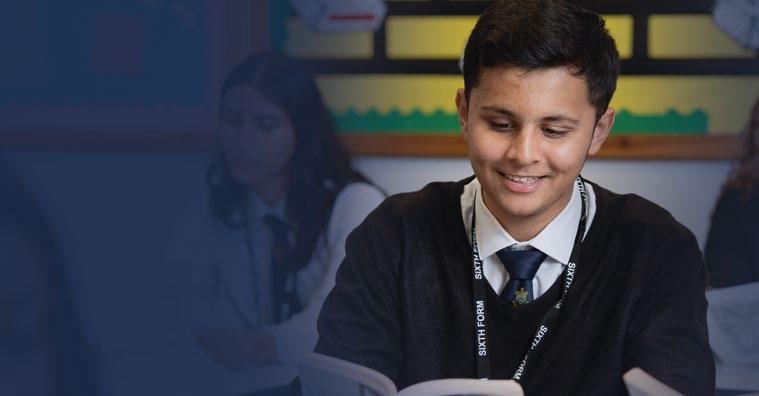

BIG
5 in GCSE Art.
The Art learning area is a relaxed and supportive environment. You will be guided to develop your own independence and encouraged to explore and experiment in response to different sources. As this is a small learning area, we can guarantee that support will be personal and tailored to your needs.
You will be required to work in one or more area of Fine Art although you may explore overlapping areas and combinations of areas, such as: drawing and painting; mixed-media; collage and assemblage; sculpture; ceramics; installation; printmaking (relief, intaglio, screen processes and lithography); moving image; and photography.
This course directly supports progression to further and higher education, providing students with a rich platform to inspire a lifelong interest in art and design.
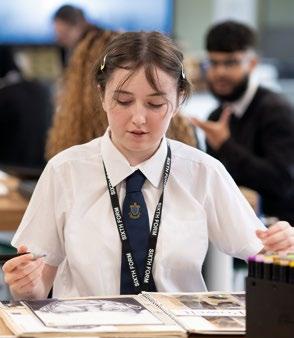
I enjoy A level Fine Art as it allows you to express your creativity in a way that no other A level does. The way you are guided to develop your skills and experiment beyond your creative comfort-zone is why I love studying this course.
OCR
6 in GCSE Biology (or 6:6 in Combined) and 6 in GCSE Mathematics.
Biology is the study of living things, how they work, how they interact and how they affect the world around us.
The A level course is very wide-ranging, from molecular biology to the study of ecosystems, and our teachers will make sure the course is interesting and inspiring. Biology is a subject that is relevant to everyone throughout their life and will train you to think scientifically, a skill which is useful in all careers.
You will be taught by highly qualified and experienced teachers who have a passion for Biology and will challenge you to make sure that you gain the highest possible grade at the end of the course.
A large proportion of our students enjoy Biology so much that they go on to study Biology-based degrees at university, a true measure of our success.
The teachers are inspiring and really bring the course to life. Learning is fun and interactive and enables you to understand the world.
Naeema, Year 13
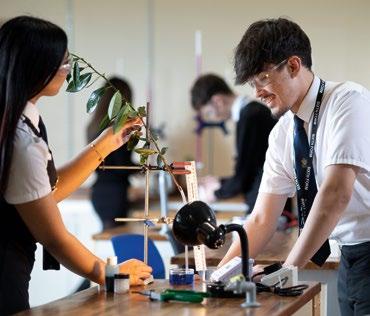
OCR
5 in GCSE Biology (or 5:5 in Combined) and 5 in GCSE Mathematics and 4 in GCSE English.
The OCR Level 3 AAQ Cambridge Advanced National in Human Biology (Extended Certificate) offers students a course designed to lead into employment although many students will continue on to higher education, particularly in the NHS and medical sciences sector.
The course develops key knowledge, understanding and skills relevant to the subject and particularly develops transferable skills that are important for progression on to HE and communication skills that are applicable to real-life contexts and work situations. These skills are delivered in context of learning about the fundamentals of Human Biology, health and disease, genetics, and biomedical laboratory techniques amongst others.
It is assessed by in six units; two externally assessed exams and four NEA coursework units.
If you have a strong interest in science matched with a good work ethic and an ability to meet coursework deadlines, then this course is ideal.
I chose this course as I was interested in the aspects of what goes on inside our bodies and how it can be treated when things go wrong. The coursework aspects allow me to do lots of self discovery about topics I have lots of interest in such as biomedicine and diseases which affect the brain. I hope to go into paediatric/ neonatal nursing and this will help me with that goal.
EDEXCEL
6 in GCSE Business or 6 in GCSE English Language and 5 GCSE Mathematics.
A level Business is an exciting and dynamic subject that involves studying how and why business decisions are made. You will explore the main functions of a business (such as operations, finance, human resources and marketing) and look at how businesses might be affected by the external environment.
It is one of the most varied and interesting subjects available and is very well regarded by both employers and universities. Business would be a great course choice for any student considering a professional career or running a business.
You will gain a thorough understanding of how organisations operate, alongside developing a wide range of skills including analytical and critical thinking skills, problem solving, decision making and logical thinking. You will also develop strong oral and written communication skills.
10% of the course is quantitative, so numerical skills are developed throughout the course in the context of a Business.
A level Business has helped to develop my analytical skills and understand the wider economic environment in which businesses operate. It has inspired me to study Business Management at university.
Mohammed, Year 12
6 in GCSE Chemistry (or 6:6 in Combined) and 6 in GCSE Mathematics.
Chemistry is the science which looks at how all matter is composed, what its properties are and how it reacts and interacts with other matter. It helps you to understand how reactions can be used to form new substances, how easily and quickly they can be made and how you can analyse and identify them.
Sometimes described as the ‘hidden science’, Chemistry is not always recognised but its influence is felt in every aspect of our lives, e.g. clothing, food, fuels, building materials, cosmetics (from simple cleaning materials to expensive perfume), plastics, recycling, medicines and new technologies – all of these have their development rooted in Chemistry.
We teach Chemistry with the aim of inspiring students:
• Who wants a career in Chemistry;
• Whose career demands a high Chemistry grade (e.g. Doctor, Dentist, Pharmacist, Chemical Engineer etc.);
• Who wants to know more about how our world works;
• Who just loves the subject and simply wants to know more.
and they provided us with the knowledge and resources to achieve our potential.
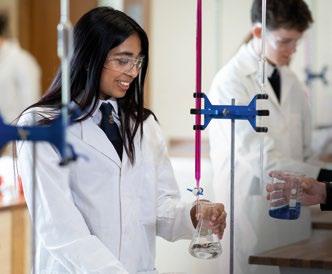
6 in GCSE Mathematics and 5 in GCSE Computer Science.
Computer Science has changed the world and will continue to innovate how we live our daily lives forever. We rely on technology each and every day, you are using technology to read this online right now! But what are computers? How do they work? Exactly how are you reading this on your screen?
Computer Science is an exciting and dynamic subject which challenges you to think differently and creatively to solve problems. Advances in computing are transforming the way we work. This course covers the fundamentals of computer science and develops a high level of programming skills. You will study how computers work – from understanding hardware to the way data is stored and processed.
Almost half the course is practical. You will spend a lot of time learning how to program and in Year 13 you will complete a project focusing on area of coding you find interesting to solve a problem.
We aim to inspire you in Computer Science by having lots of kit you can use including a robot, Raspberry Pis and giving you the opportunity to mentor other students. Our Computer Science team are passionate in helping you achieve and to develop your skills to help you further your Computing career.
Subjects
Computer Science offers the chance to gain a greater understanding of how computers work and the way they are programmed. It is interesting to learn about computers, especially with technological developments in modern society and the demand for improved programs.
Mark, Year 12
WJEC
5 in GCSE English Language OR Literature.
Criminology is the study of crime and criminals. In the first year, students examine theories of crime, including the nature versus nurture debate in an attempt to decide whether criminals are born or moulded by the environment they are raised in. They also look at how campaign groups and the media can influence changes in the law.
The second year involves learning about the various procedures and personnel involved in detecting crimes, such as the police and crime scene investigators. The final unit focusses on how institutions like the courts and prisons try to punish and ultimately control crime.
The course is modular and assessment takes place in December and May each year. In December there is a controlled coursework assessment and in May there is an external examination. This is then repeated in year two. The course is equivalent to one A level and carries the same UCAS points for university entry.

5 in GCSE English Language.
Data shapes our world, driving innovation, efficiency, and informed decision-making. It unveils patterns, predicts trends, and fuels breakthroughs in science, technology, and business. Learning about data empowers you to solve complex problems, enhance critical thinking, and influence future advancements. Embrace data; become a catalyst for positive change and limitless opportunities.
This course will teach students about the fundamentals of data and equipping you with the knowledge and skills to be successful in a modern work place. This is a unit based course with a mixed of practical and examined assessment.
There are five units in total:
In Fundamentals of Data Analytics, students explore how data is gathered, structured, analysed, and stored. Big Data and Machine Learning examines how large-scale data is used by governments, environmental organisations, and businesses, as well as its role in artificial intelligence and machine learning. Spreadsheet Data Modelling develops skills in using data to create models, manipulate information, and produce visual representations which are a valuable ability in many workplaces. Data and the Internet of Everything (IoE) introduces students to the concept of interconnected systems and challenges them to design their own IoE example to share with stakeholders. Finally, Data and Digital Marketing focuses on creating a targeted digital marketing campaign using data to guide and refine the approach.
Software Development
Games Design
Helpdesk/ Technical Support
Project Management
Cyber Security
Web Development
Data Analytics has completely changed the way I look at information. It’s amazing to see how numbers can tell a story and help make real-world decisions.
Bilbin Year 12
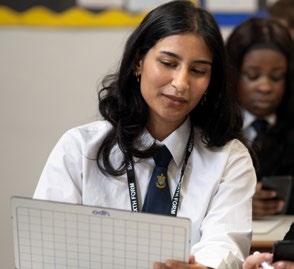
6 in GCSE English Language.
English Language is a popular subject here and our students study a range of fascinating topics such as language and gender, regional variation, the language of social groups, and child language acquisition.
You will learn to analyse the ways in which language is used by different groups in the real world. We also explore a range of written and spoken texts, learning to understand the complicated process by which texts ‘work’, considering not only the purpose, genre and audience but also the society in which a text was written and the linguistic features used.
Over recent years, the results students have achieved have been excellent.
is down to the hard work and dedication from specialist staff and the passion and enthusiasm shown by students. We also make sure that the choice of topic for your language investigation – which is your coursework – is up to you: we give you guidance but will encourage you to pursue the area of English Language which interests you the most.

The English department at St Wilfrid’s is unparalleled in terms of enthusiasm and interaction with students. This makes the topics taught – such as ethnicity, language and gender, and language change – enthralling. Liam, Year 13
I have come that they may have life, and have it to the full.
John 10:10
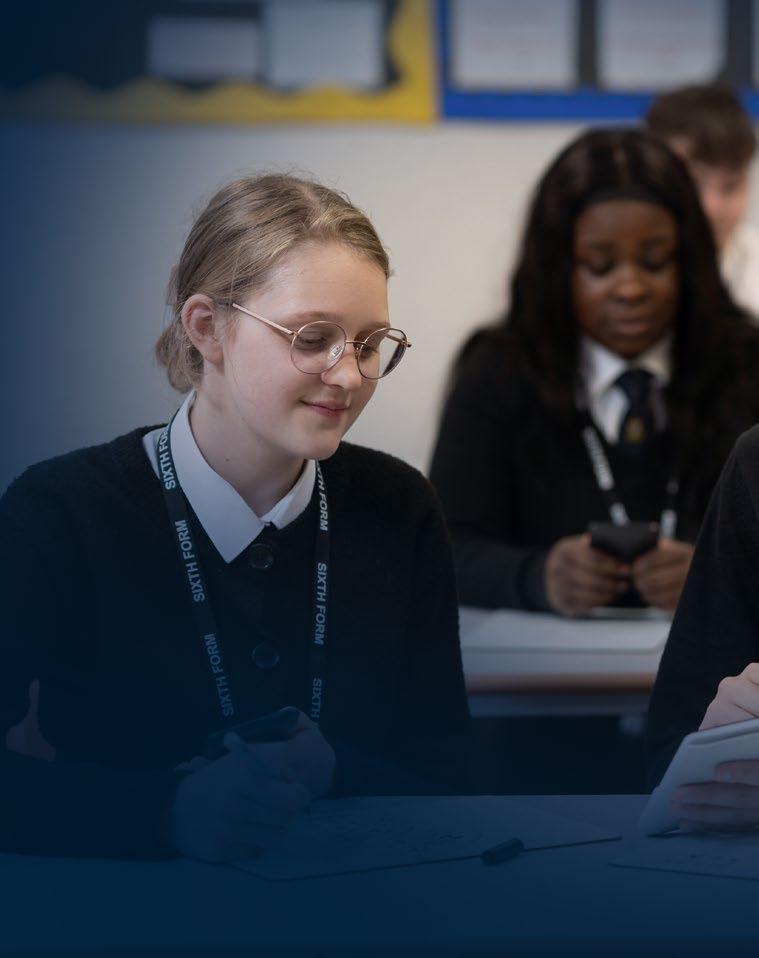
BIG ENOUGH TO CHALLENGE SMALL ENOUGH TO CARE.
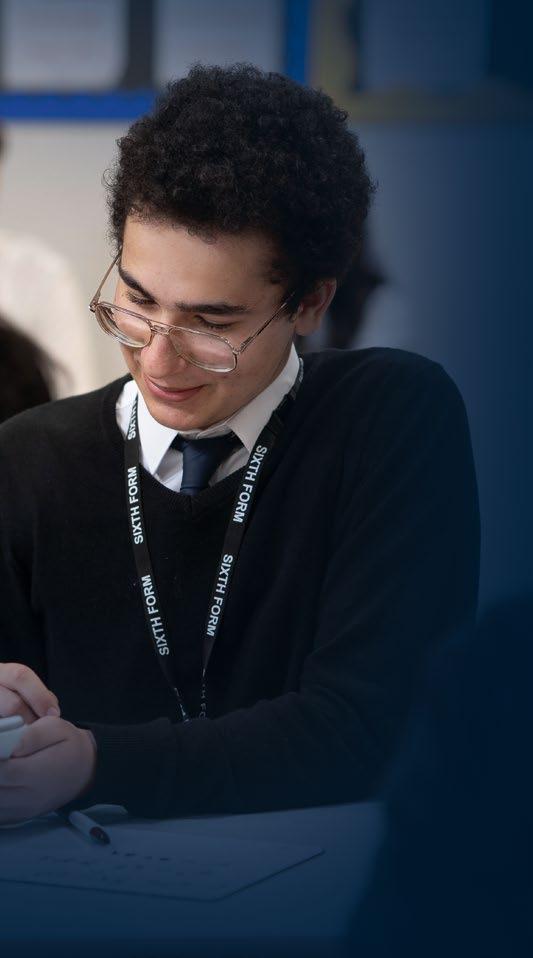
AQA Specification B
6 in GCSE English Language and 6 in GCSE English Literature.
Everything that has ever been written in poetry, prose or drama is a record of the thoughts and ideas which people have had through the ages.
By taking English Literature, you will be studying the history of what people have thought and felt. This subject considers how and why writers make the choices they do, so that readers respond to the messages in their texts; this involves analysing the language and techniques alongside the contexts surrounding their production.
During the two years you will study a range of poetry, prose, and drama texts, from Coleridge’s poem ‘The Rime of the Ancient Mariner’ to Arthur Miller’s play Death of a Salesman. Preparation for the ‘unseen’ question allows us the freedom to explore extracts from a range of crime fiction whilst the coursework component allows you to pursue your own interests, studying a novel of your choice through the lens of literary theory.
English Literature has shown me that analysing books from different perspectives opens up a world of knowledge. The teaching is beyond great and I feel as though I have achieved more at A level and have a better understanding of the works of past authors and poets.
Raqiba, Year 13
6 in GCSE French and 6 in GCSE English Language.
This course helps students to develop their understanding of spoken and written French. You will learn to communicate confidently, clearly and effectively using increasingly accurate language.
You will also be encouraged to develop your use of complex and varied language as well as your critical insights into society, culture and the way of life in France and French-speaking countries. A wide range of topics will be explored whilst improving reading, listening, speaking and writing competencies, therefore ensuring this wellrounded subject is of real interest to universities.
In order to prepare for your A level programme, you should aim to read as much as possible in French to extend your knowledge of vocabulary. Try to watch some French films and listen to some French music. You should also regularly revise your grammar. Take every opportunity to speak French and, if at all possible, visit France or another French-speaking country.
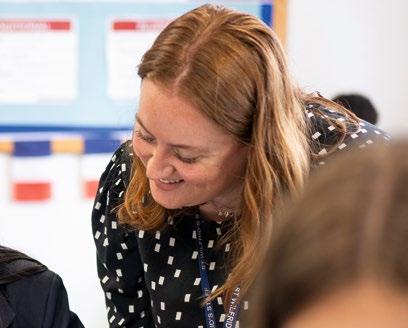
Studying French at A level has broadened my horizons beyond
6 in GCSE Geography OR 5 in GCSE Geography and a 6 in both GCSE English and GCSE Maths.
Geography is a broad and enabling subject, highly regarded by Russell Group Universities. You will develop a range of transferable skills, working on your analytical, investigative, numerical and written skills, as well as incorporating new technologies. The content will inspire you to engage critically with real world issues and places, and apply your knowledge, theory and skills to the world around you. Students grow as independent thinkers and as informed and engaged citizens, who understand the role and importance of geography as one of the key disciplines relevant to understanding the world’s changing peoples, places and environments.
Fieldwork is an integral part of your studies giving you an experience of both human and physical fieldwork (you will complete 4 days in total across Y12 and Y13). You will learn a variety of data collection skills and test core topic theories learnt in the classroom. From this you will complete an independent piece of coursework worth 20% of your A level.
There is also the opportunity to become a Geography ambassador as part of enrichment, by helping out in a KS3/KS4 lesson and providing support to learners. This in turn develops your geographical understanding.
Geography incorporates a lot of knowledge and skills that I study in other subjects, making it relevant and useful. It’s challenging but interesting to learn about the world and things I see in the news all the time.
Sope, Year 13
OCR
5 in English and 4:4 in science (or a 4 in GCSE Biology).
The OCR Level 3 AAQ Cambridge Advanced National in Health & Social Care (Extended Certificate) offers students a course designed primarily designed to lead directly into employment, although many students will continue on to higher education.
The course develops key knowledge, understanding and skills relevant to the subject and particularly develops transferable skills that are important for progression on to HE and communication skills that are applicable to real-life contexts and work situations. These skills are delivered in context of learning about key principles of Health and Social Care, anatomy and physiology, having a person-centred approach to care and supporting people with mental health conditions amongst others.
It is assessed in six units; two externally assessed exams and four NEA coursework units. If you have a strong interest in Health & Social Care matched with a good work ethic and an ability to meet coursework deadlines, then this course is ideal.
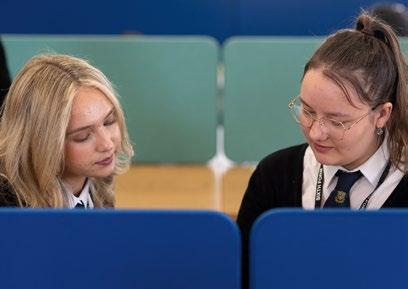
Nursing
Health and Social Care has really allowed me to broaden my knowledge of Health and Social Care settings. I am glad this subject is available and I am excited to learn about Anatomy and Physiology in Year 13.
Adaah, Year 12
6 in GCSE History.
History is a challenging and rewarding A level subject. Students who take History do not just learn facts; they develop skills in analysis, problem solving, independent learning and communication.
Students who study history have the opportunity to explore events that have shaped the world we live in. Our topics cover a wide chronological, geographic and thematic range: from late medieval times to the present day; from the United States to Russia; from the English Reformation to the US Civil Rights campaigns of the 1960s.
Our students also develop a number of important academic skills, including the ability to critically evaluate source material, and produce written arguments that are well structured, coherently expressed and fully supported by the careful selection of evidence.
Studying History at St Wilfrid’s has given me a greater understanding of how the past can be interpreted in different ways. It has helped me to enhance my analysis and evaluation skills; considering impact and significance, as well as cause and consequence.
Katie, Year 13
5 in GCSE English Language and 5 in one other essay based GCSE subject.
Law is about the legal system in England and Wales.
Firstly, you will develop the fundamental knowledge and understanding of the nature of law and the English legal system. Students will then study criminal law along with its application to both fictional and real life cases. The second year focuses on civil law, namely tort law and contract law, where application and evaluation skills will be developed further.
Studying Law at A level will allow you to develop problem-solving skills through the application of legal rules. It also develops analytical ability and critical thinking skills.
If you decide to study A level Law, you will join a team which believes that your academic achievement should be our complete focus. Career progression is also a key priority, so there will be opportunities to engage with members of the legal profession. You will be encouraged to undertake work experience in a legal setting.
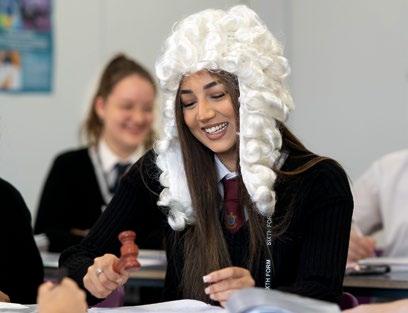
Law has opened my eyes to the array of decisions made by those who work in the legal profession. Studying Law has strengthened my analytical skills and the range of interesting topics really keeps your mind ticking over.
Kathleen, Year 13
5 in GCSE Mathematics.
The Level 3 Mathematical Studies course (also referred to as Core Maths) aims to build on the knowledge, understanding and skills established at GCSE. This qualification is designed to be studied over one year, with a final exam taken at the end of Year 12. It is ideal as a fourth subject.
The focus is to consolidate your mathematical understanding and build both confidence and competence in applying a range of mathematical techniques to solve a variety of problems. The course introduces new techniques and concepts which will prepare you for further study and future employment within a broad range of academic, professional and technical fields.
Mathematical Studies will support you with the demands of higher education and work, where there is a distinct mathematical element, but where the mathematical demands do not stretch to a requirement for A level Mathematics. The government has recognised the need for more students to continue with mathematics and this course allows this with a more practical approach to certain areas. This course will provide the extra study and development of key problem-solving skills which are required by all employers.
I chose Mathematical Studies because I enjoy maths, but had already chosen three other A levels. This course seemed attractive because it allows me to continue with maths, it complements my other subjects and will help me when I am applying for university.
Sufyaan, Year 12
7 in GCSE Mathematics.
Mathematics complements many other subjects and is good training for the mind, helping to develop logical thinking and problem-solving skills. You will study pure mathematics, statistics and mechanics and cover a wide range of topics which broaden the knowledge gained at GCSE.
The pure mathematics units focus on the algebra, geometry, trigonometry and calculus content of the course. Alongside this is the study of statistics which extends the work on data analysis and probability, looking at hypothesis testing and the normal distribution. This will really support you alongside subjects such as Biology, Geography and Psychology. Mechanics introduces topics such as mathematical modelling, kinematics, statics and dynamics and fits well with the study of Physics.
Students with mathematical qualifications are numerate and highly employable in a wide variety of areas. An A level in mathematics is essential for many degree courses and employment prospects are excellent.
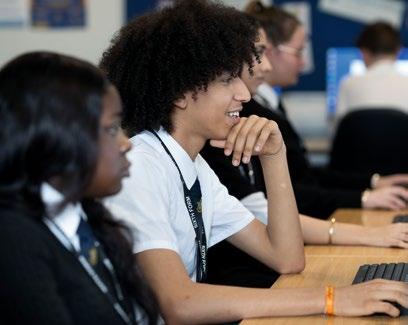
I chose maths because I enjoy it and I know it’s a valuable A level that can help you stand out. The
8 in GCSE Mathematics.
The Further Mathematics course is a separate course which stands alongside the main A level course.
Further Mathematics allows you to explore a greater range of topics in the mathematical canon, with the standard of the topics at the same level as the main A level course. Further Mathematics is not just for those who wish to study mathematics at university. Anyone who wants to study a mathematics related degree should consider the advantage of having an A level in Further Mathematics.
You will study a wide variety of different areas of mathematics, including pure mathematics, decision mathematics and statistics.
Further Mathematics will enable you to improve your mathematical understanding and your standard in the A level Mathematics course. It will also considerably develop your problem-solving skills helping you to make a smooth transition on to any degree or training programme containing mathematical elements.
Further maths is perfect for those who enjoy a challenge and can think in ways that most people can’t. It’s about having a good aptitude for problem solving.
Becca, Year 12
EDUQAS
4 in GCSE English Language.
With companies like Disney reaching every corner of the earth and making global profits in the billions, the power, influence and effects of the media are certainly worth studying. Taking Media Studies requires an inquisitive mind and is suitable for anyone who asks questions about the world in which we live.
You will study the following:
• How various media products are constructed;
• Why media products are made and who they are made for;
• The effects media products have on society and culture;
• The power of the media and the people behind it.
Lessons will involve analysing media products from broadcast, print and e-media platforms. We learn how and why they are constructed, in order to make our own products and to evaluate the effects of this mass communication on the audience and society.
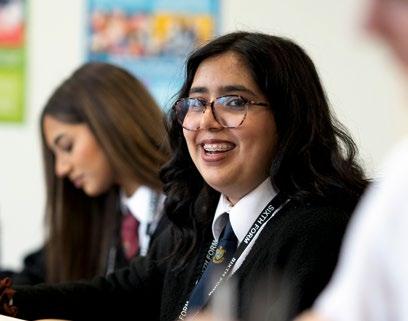
A level Media will give you great analytical skills and will change the way
PEARSON | EDEXCEL
5 in two essay based subjects.
Studying Religious Studies develops an appreciation of religious thought and its contribution to individuals, communities and societies. It facilitates enquiry into, and develops insightful evaluations of, ultimate questions about the purposes and commitments of human life, especially as expressed in philosophy, ethics and religion. By studying Religious Studies at A level it will encourage you to compare the significant ideas presented in works of scholars selected from the fields of philosophy, ethics and religion. This will enable you to reflect on and develop your values, opinions and attitudes in the light of such studies.
Choosing Religious Studies will help you develop a much better understanding of yourself and how the past has helped to shape the society in which we live. Religious Studies fuses together many different disciplines which will enable you to become logical, open-minded and analytical in thought.
Religious Studies is a rigorous A level, akin to philosophy in its demands and degree of difficulty, and it provides excellent preparation for a number of popular and demanding undergraduate courses. The skills learned by taking Religious Studies are highly valued in many occupations and is useful for entry to many degree courses. Those who go on to study Religious Studies at undergraduate level are among the highest employment rates of all students, and find themselves at home in a diverse range of careers.
Religious Studies has enabled me to critically analyse and formulate judgments about worldly and controversial topics. It’s opened my mind to many perspectives, which can be entertained without always being accepted.
Samuel, Year 12
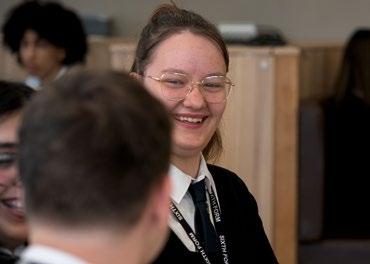
5 in GCSE Art or GCSE Photography.
Digital Photography will provide you with a rich platform to inspire a lifelong interest in Photography. It is a highly creative subject that will challenge you to respond to given briefs and themes by developing your own ideas. You will have the opportunity to go on location shoots as well as explore studio techniques and learn how to select and manipulate images to communicate your ideas.
We have a fully equipped computer suite as well as industry standard editing software available across the Academy. DSLR (digital single-lens reflex) cameras are available for every student who chooses Digital Photography, although you may be inspired to buy your own.
Students are required to work within one or more area of photography, such as: portraiture; landscape photography (working from urban, rural and/or coastal environment); still life photography (working from objects or from the natural world); documentary photography; photojournalism; experimental imagery; multimedia; moving image (video, film, animation).
Students can progress onto university to study degrees in a variety of fields, including: photography; art & design; fine art; illustration; animation; film; journalism; advertising; graphics; fashion; and marketing.
A level Photography is a way of stepping out of your comfort zone as you have the freedom to try something new and develop your skills. I love being able to experiment with non-traditional techniques that challenge people’s concept of photography.
OCR
Grade 6 in GCSE PE (It is possible to take A level PE if you did not take GCSE PE. In this case, you will need grade 6 in Science).
This course combines the development of your Physical Education theory, whilst encouraging you to develop your practical skill set. We are proud of our performance in A level PE, with students often going on to study sports-related courses at undergraduate level.
You will study how modern day sport has emerged alongside contemporary issues such as drugs, the media and the Olympics. You will learn about anatomy and physiology, examining in detail how the body’s systems affect sporting performance. In the second year, we look at biomechanics, energy systems and injury prevention.
The course has a component relating to how we learn skills and sports psychology as well as a practical element where performance is measured in one sport along with an assessed speech.
It’s
great to understand some of the anatomy and physiology behind our movements and learn how this knowledge can help to promote both mass participation and elite performance.
Year 13

OCR
6 in GCSE Physics (or 6:6 in Combined) and 6 in GCSE Mathematics.
Physics is the science which underpins all others. It is ultimately the study of how the universe works. It is a dynamic subject which is constantly developing and there are always new ideas to be explored. Physicists ask the really ‘big questions’, such as: “How did the universe begin?”, “How does the Sun keep on shining?” and “What are the basic building blocks of matter?”. If you’re fascinated by these questions, you will enjoy studying Physics at A level and beyond.
Studying Physics at St Wilfrid’s will allow you to explore the subject and develop your skills in a supportive environment where the focus is on your development. You will be supported by a team which is committed to ensuring all students achieve their potential. We have an ‘open door’ policy and provide targeted support to ensure you reach your goals. In addition, we are passionate about Physics and our aim is for you to feel the same! You will be encouraged to pursue a deeper understanding of the subject through wider reading and we often provide opportunities to experience what studying Physics at university or pursuing a related career is like, by running trips or inviting in guest speakers to talk to you.
I picked physics as I am fascinated by many of the topics within the subject and how they link to the universe around us. Matthew, Year 12
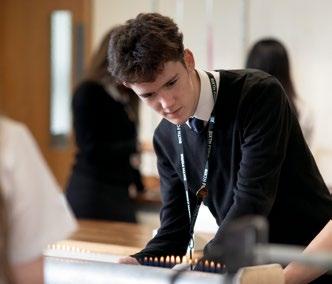
6 in GCSE Biology or Combined Science and 5 in GCSE English Language.
Psychology is the scientific study of human behaviour and mental processing. It helps you pose questions and gain a deeper understanding of people’s interactions and motivations.
The course begins with an introduction into Psychology and understanding the different approaches and methods used to study human behaviour. A selection of topics is then studied from key areas in Psychology such as Biological Psychology, Phobias, OCD, Depression, Treatments, Conformity, Memory, Eye Witness Testimony and Attachment.
Psychology allows you to explore key explanations of human behaviour such as the influence of the nervous system, early experiences, social influences and the environment.
In Year 13, more applied areas are studied, such as Relationships, Schizophrenia and Forensic Psychology. Students will also learn about key debates and issues.
We follow the AQA Specification. The course will be assessed by three written examinations taken at the end of the second year of the course. There is no coursework in this subject.
Psychology is intriguing because we learn about the deeper aspects of human nature. It is a great subject to study at university as it opens doors to many different career paths.
Zainab, Year 12
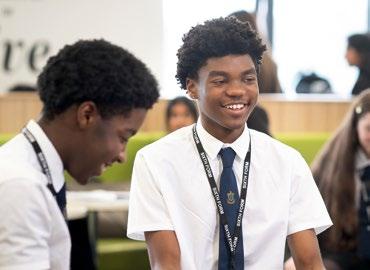
AQA
5 in GCSE English Language and 5 in one other essay based GCSE subject.
Sociology is a very popular A level subject which examines people in society and why people behave the way they do. The course enables students to understand the behaviour of themselves and others. A key focus of study includes a look at diversity, class, gender, race and ethnicity, inequality, economics and culture.
In order to identify the principal causes of behaviour students study many aspects of society. Topics include Education, Crime and Deviance, Theory and Methods and various option topics, which can include The Family, Health, Globalisation, Media or Culture and Identity.
It is important that students have an interest in why people act in certain ways and are aware of current affairs and social issues. Lessons are designed to engage learners through the promotion of discussion, debate and inquisitive thinking.
We follow the AQA Sociology Specification. The course will be assessed by three written examinations taken at the end of the second year of the course.
To study in our Sixth Form, you will require at least 5 GCSE passes. Two of these will need to be at grade 5 or higher, with a further three at grade 4 or higher. The specific criteria for each subject are listed below:
Art (Fine)
5 in GCSE Art
Biology
6 in GCSE Biology (or 6:6 in Combined) AND 6 in GCSE Mathematics
Biology (Human – L3)
5 in GCSE Biology (or 5:5 in Combined) AND 5 in GCSE Mathematics AND 4 in GCSE English
Business
6 in GCSE Business OR 6 in GCSE English Language and 5 in GCSE Mathematics
Chemistry
6 in GCSE Chemistry (or 6:6 in Combined) AND 6 in GCSE Mathematics
Computer Science
6 in GCSE Mathematics AND 5 in GCSE Computer Science
Criminology (L3)
5 in GCSE English Language/Literature
Data Analytics (L3)
5 in English Language
English Language
5 in GCSE English Language
English Literature
6 in GCSE English Language AND 6 in GCSE English Literature
French
6 in GCSE French AND 6 in GCSE English Language
Geography
6 in GCSE Geography OR 5 in GCSE Geography and a 6 in both GCSE English and GCSE Maths
He alth and Social Care (L3)
5 in GCSE English Language AND 4:4 in Combined Science (OR 4 in GCSE Biology)
History
6 in GCSE History
Law
5 in GCSE English Language AND 5 in one other essay based GCSE subject
M athematical
Studies (L3)
5 in GCSE Mathematics
Mathematics
7 in GCSE Mathematics
Mathematics (Further)
8 in GCSE Mathematics
Media Studies
4 in GCSE English Language
P hilosophy, Ethics and New Testament
Studies (RS)
5 in two essay based subjects
Photography (Digital)
5 in GCSE Art OR GCSE Photography
Physics
6 in GCSE Physics (or 6:6 in Combined) AND 6 in GCSE Mathematics
6 in a GCSE Biology (or Combined Science) AND 5 in GCSE English Language
Sociology
5 in GCSE English Language AND 5 in one other essay based GCSE subject
Students will be required to resit GCSE English or Mathematics if they do not achieve a grade 4 or above. We are unable to accommodate students who do not achieve a grade 4 in both subjects. We reserve the right to alter this offer according to individual circumstances.
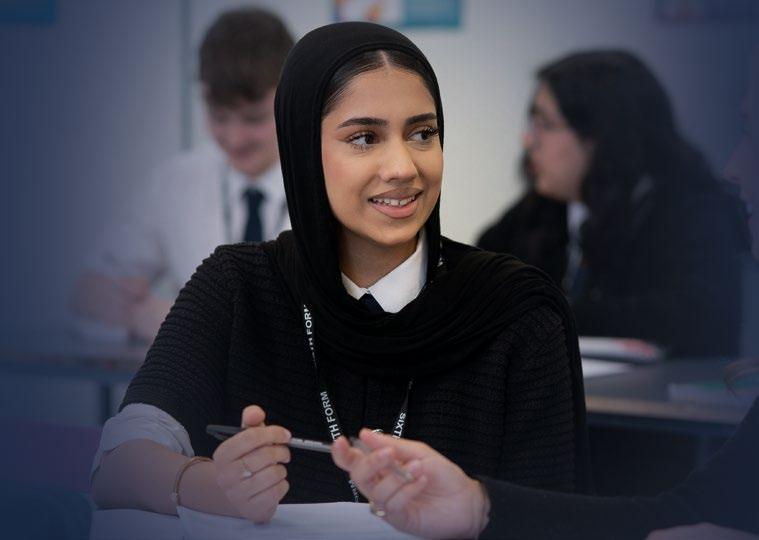
Applications to St Wilfrid’s Sixth Form can be done online via the website at www.sixthform.saintwilfrids.co.uk
Applications should be submitted by: Friday 9th January 2026 to ensure an early interview.
Following the submission of your application, you will receive a letter inviting you for an sixth form interview, which will take place in the Sixth Form centre. If you are successful you will be offered a place, subject to meeting the entry requirements of your chosen courses.
If you have any questions about the application process, or would like to know more about the Sixth Form, please contact Mrs Cass, Head of Sixth Form, via email at hcass@saintwilfrids.com.
We look forward to welcoming you into our Sixth Form in September 2026!

Lord direct us to LIVE life to the full